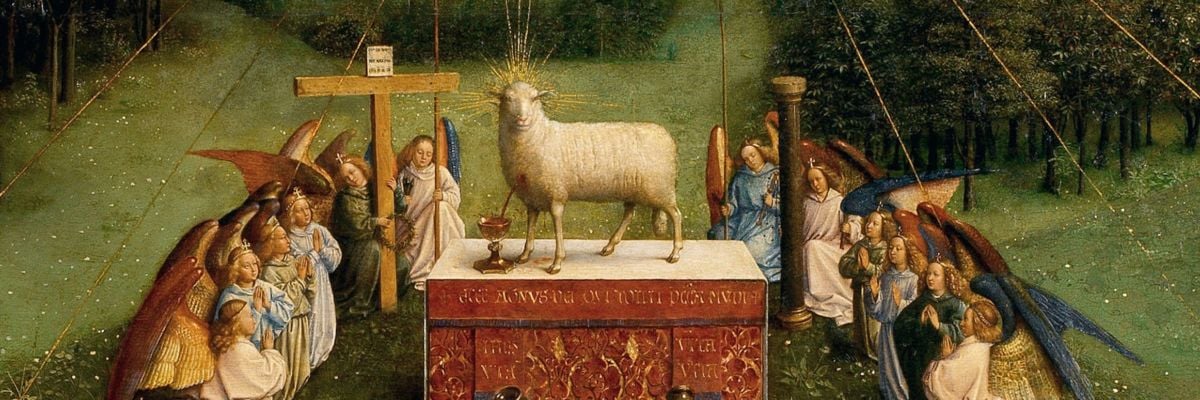
Last week, Hebrews 12 exhorted us to “lift your drooping hands and strengthen your weak knees” (12:12). Wake up, in other words, and run the race that is set before you, in the company of this “great cloud of witnesses” from Hebrews 12:1. But where does this race go? Where are our strengthened knees supposed to take us?
The Gospel reading today gives us a pretty definite answer: we want to get to the wedding banquet, which is the kingdom of God that Jesus, in his incarnation, has brought to earth. And this involves going through a narrow door that will only be open for a limited time— as we heard in last week’s Gospel. But according to this week’s lesson, entering in isn’t the final thing: it’s also the way that we enter.
Fast forward to the epistle to the Hebrews. Having brought heaven to earth, according to Hebrews, the incarnate Son then returned to heaven, where, in his flesh, there is now a place for us in the presence of God. That is the main doctrinal point of Hebrews.
But you have come to Mount Zion and to the city of the living God, the heavenly Jerusalem, and to innumerable angels in festal gathering, and to the assembly of the first-born who are enrolled in heaven, and to a judge who is God of all, and to the spirits of just men made perfect, and to Jesus, the mediator of a new covenant, and to the sprinkled blood that speaks more graciously than the blood of Abel (Heb. 12:22-24).
This breathtaking scene is contrasted with another: the side of Mount Sinai where Israel received the Law in fire, darkness, and gloom. If the one was a cause of trembling and awe, how much more the other? If the manifestation of God was terrible on earth, how much more the splendor of the temple in heaven?
This is followed by a warning: do not refuse him who is speaking. The warning hearkens back to the earlier refrain in Hebrews centered on the words of Psalm 95: “Today, when you hear his voice, harden not your hearts.” The alternative is to listen, to accept, to respond and receive, and then, in verse 28, to “offer to God acceptable worship, with reverence and awe.”
The contrast here, between the earthly temple and the heavenly temple, contains a whole further set of contrasts: between the endlessly repeated sacrifices of the old covenant and the one all-sufficient sacrifice of the Cross; between the dietary restrictions of the law that, in the words of Hebrews 13, “do not benefit their adherents,” and the new spiritual food which is the grace of God. In all these cases, there is a definite preference for the latter: the old has given way to the new.
Now, to some readers, the new altar of sacrifice is not an actual altar, but just the human heart. And this is how many modern Christians would read the call in Hebrews 12 to “acceptable worship.” It’s funny how “acceptable” worship seem to mean, for these modern people, exactly the kind of worship that modern people seem to like—which is to say, none at all. Or, at most, “acceptable worship” means worship in our heads. It means thinking pious thoughts and feeling pious feelings. It means finding “meaning” in things, which seems to be a popular concept among the aging devotees of the 1960s’ revolution. It certainly doesn’t mean going somewhere.
But Hebrews wants us to go somewhere: to the “city of the living God.” And if this seems like a spiritual version of meaningfulness—something that we could do just as well seated in our favorite chair at home or at the beach—that is because we have substituted a modern version of “spirituality” for the spirituality of Hebrews.
In Hebrews, the contrast is, indeed, between things “made with hands,” like the old temple and its sacrifices, and things that are eternal and unshakeable. But to say that our goal is spiritual does not mean that our goal is to fly into the sky with our own thoughts. Instead, it means, very specifically, that the new and everlasting way to the kingdom of God, the biblical way that Hebrews prescribes, is the body and blood of Jesus Christ (10:19-20).
We are going somewhere. We are moving toward heaven. We are going to the heavenly altar, in the heavenly temple, in the heavenly Jerusalem. But we are also already there. This altar is the heavenly altar, and when we “lift up our hearts” we lift them up not just to pious reflection but to the eternal throne of grace, which is accessible through the blood of Jesus.
Our destination is the kingdom of God; it is Jesus. And so, our destination is also where we are, because we have found him here in his Body the Church. To practice “acceptable worship” means rejecting the dilemma between an earthly altar and a spiritualized altar. There is one altar, and one sacrifice, and it is here, where the spiritual flesh of Jesus unites heaven and earth. Our goal is not to find the altar’s disembodied “meaning,” but to approach it on our knees.
With awe and gratitude, then, let us approach the city and the altar of God, knowing that, in the flesh of Jesus, we have true worship and have been given full access to “a kingdom that cannot be shaken.” Amen.



